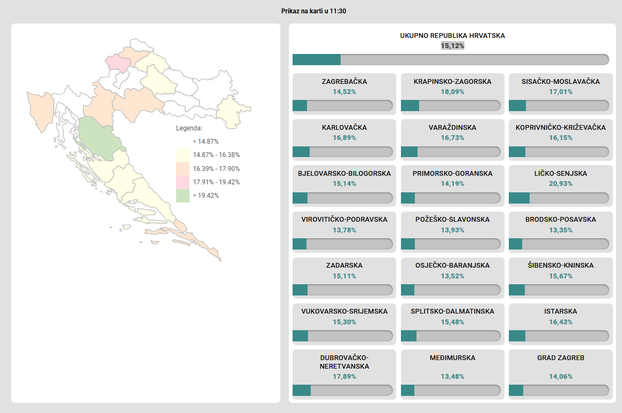Tired of elections, Portuguese voted today with the hope of just a stable government

For many Portuguese, the hope of the Sunday General elections is quite element: a government that can cope with the challenges caused by global trade tensions and other geopolitical factors, and the end of the continuous cycle of walking to the urn every year.
But for the skeptical inhabitants of Marina Grande, a workers’ city with 40,000 people in Central Portugal even seems like desirable thinking.
The restrictions on the tramping of Europe
Voting is the third general election for so many years and comes after a 10-year period of fragile governments, only one of which had a parliamentary majority, but nevertheless fell apart in the middle of its term last year.
- A study by the Sociological Agency of the Catholic University of Lisbon, published by the television operator RTP late on Thursday, provides support for AD to Prime Minister Montenegro 34%, compared to 32% in the same study a week ago.
- Support for the main rival of AD, the left -wing socialist party (Pd), dropped from 28% to 26%. However, this result would leave AD unable to form a stable government as it would not be able to provide a parliamentary majority that can only be achieved with at least 42% of the votes.
- The far -right fuss, with which Montenegro refuses all transactions, is stable in third place in polls by 19%, over last year’s score of 18%, even after scandals involving several senior party members.
Luis Shimoens, a 36-year-old worker at a molding plant, is among the worried that no permanent government will appear on Sunday, leaving this stability that depends on the fragile deals between the parties. And this, in a time of global trade tension, caused by Donald Trump’s customs blitz, and the high internal tax burden. « If they (parties) do not reach an understanding there up the pyramid, we will suffer here, » he told Reuters.

The influence of the new US duties on imports – including the EU – has almost not been present in the election campaign, although Portugal’s net exports have already felt the difficulties in the first quarter, and the economy has shrunk from the previous three months, which has caused alarm in the big exporters of Marina Grande.
The Portuguese molding industry is the third largest in Europe after Germany and Switzerland, with sales of almost € 1 billion a year, mainly to other European countries. The shapes are used to produce plastic toys, cars and panels for airplanes.
The president of Iberomoldess Joakim Menezesh, whose company exports 90% of his production, said he fears that commercial tensions could affect his large European customers and subsequently his company, while continuing political instability, would only deepen these risks and « surely » we would have.

Public opinion studies show that the right -wing democratic alliance (AD) of Prime Minister Luis Montenegro will receive the most votes, but not a parliamentary majority – a result similar to the previous vote in March 2024.
There is also a slight change for his eternal rival, the left -wing socialist party (PS), which is on his heels.
Adam Mihnik: The Trump Administration holds a powerful, destructive flamever
Marina Grande has traditionally voted for the Socialists, but in the election last year, many turned to the far -right CAGA Party, which won 20.5% of the vote in the region, compared to 7% in 2023. PS won 29.8%, which is well under 43.5%, which won the previous year in the region.
At the national level, the Cassation rating in polls has been steadily declining since its parliamentary representation last year. Its anti-elite and anti-immigration rhetoric is considered to be too toxic to serve as a determining factor for any party.
| No party has come up with new suggestions to generate great enthusiasm among the Portuguese or respond to their concerns. |
« Every party just says that it is serious and the others are immoral or corrupt, » said Samuel Silva, an administrative assistant at an office in Lisbon. « Europe’s economic problems will reach Portugal sooner or later, but I don’t see any of the big parties talk about it, it doesn’t bring them votes. »

Much of the campaign focuses on questions like the business relationship of Montenegro’s family consulting firm. The problem lowered his government in March, but failed to resonate with voters – who still consider him to be a more appropriate person for the post, according to studies of public opinion. Montenegro denies any violations.
« People are not really interested in the question. They are tired, » said Professor of Political Science, Jose Tomaz Branko of the Catholic University of Lisbon, citing fatigue from voters after so many elections. « There is no much hope that the future will be different from the present, » he added.
| The only potential for some stability seems to be hidden in the fourth place of the Pro-Business Party « Liberal Initiative », which could collect enough votes to form a ruling coalition with the majority of Montenegro, with which there are some similarities. |
There may be prolonged legislative paralysis before the next election, Kostelo Branko said. New general elections cannot be convened at least until mid -2026 because Portugal will hold a presidential election in January next January. « If you are optimistic, you will hope that parties will unite the day after the election to form an alliance to rule the country at least next year, » he said.
Retired metallurgist Luis Esperanza, 58 years old, did not hop. He is angry with what he defines as a reluctance for politicians to compromise on the good of the country and criticize the disappointing campaign, dominated by « very weak ideas for the future. » « They think they don’t have to explain anything to anyone, as if we’re all idiots, » he said. « It can’t go on. »
What is the total election in Portugal?
Radio Renascence’s Sociological Studies’ Society Surveys puts AD at just over 32%, which is 10 percentage points less than a threshold, which would provide them with a full majority of 116 seats.
The Levcentric Socialists are second in the polls by 27%, just under 28%, who gathered a year ago, followed by the far -right, anti -immigrant party « fad » by 17%and with a small change from the previous elections when it studied its parliamentary representation. The right « liberal initiative » receives about 6%.
Public discontent has increased from recurring elections and unstable management, and analysts expect the abstinence from voting to increase after a record 6.47 million people voted in 2024.
Further political instability can cause delay in structural reforms and major projects, including lithium production in the north and potentially compromise the effective distribution of EU funds and the long-delayed privatization of the TAP airline.
| The average salary in Portugal of just under 2000 euros a month is well below the EU average of 3155 euros and the lowest in Western Europe, which forces many Portuguese to seek better paid work abroad. |
The Mongngenegro government has taken several measures to try to relieve brain leaks by offering tax breaks and paying off compensation to young people and the companies that hire them.
Economy
As the cost of living is still increasing after a few years of inflation above average, voters want to see specific steps to raise wages, reduce taxes, improve job security and strengthen the social assistance system.

Portugal performed better than most EU economic growth countries, taking into account budget surpluses and decreasing long-standing in both a left-centered and a right-wing government.
The economy increased by 1.9% last year and is expected by over 2% this year. But GDP unexpectedly shrunk by 0.5%. On a three-month basis in January-March, as net exports decreased, which is an indication of the country’s vulnerability to global trade tensions.
The latter surpluses have led to the overthrow of public debt below 100% of GDP, which has won praise from Brussels and investors. A surplus of 0.3% for 2025 is predicted, compared to 0.7% last year.
Immigration
About 1.5 million foreigners reside in Portugal, which is approximately three times more than a decade ago and accounts for about 14% of the total population. In Socialist Administration in 2015-2023, Portugal had one of the most open migration regimes in Europe.
The increase in arrivals, especially from Asia lately, has generated anti -immigrant sentiment and strengthened the support of the « fascination » of the election last year, although the far -right party has been stagnant in sociological studies since then.
The Montenegro Government has tightened the immigration rules, repeating efforts elsewhere in Europe to counteract the far right, but the country remains relatively hospitable, especially to migrants from Brazil and Portugal -speaking African countries.
Migrants often face uncertain jobs and lower salaries, but economists say they contribute significantly to economic growth and social security.

Housing crisis
Housing has become a central issue in the election that the new government will have to deal with. The boom in tourism helped the economy, but also fed a residential crisis, pushing the residents from the city centers and even the immediate suburbs.
Housing prices in Portugal increased by 9% last year, which is about three times the EU average.
Healthcare
The public health system is under pressure and this is another problem – with decreasing services, shortage of staff and long waiting times. Medical staff organizes strikes because of low pay and poor conditions, while patients have to endure months of treatment.








